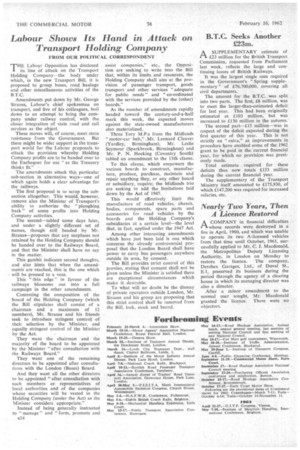Labour Shows Its Hand in Attack on Transport Holding Company
Page 30

If you've noticed an error in this article please click here to report it so we can fix it.
FROM OUR POLITICAL CORRESPONDENT
THE Labour Opposition has disclosed its line of attack on the Transport Holding Company—the body under which, in the new Transport Bill, it is proposed to group buses, road haulage and other miscellaneous activities of the B.T.C.
Amendments put down by Mr. George Strauss, Labour's chief spokesman on transport, and five of his colleagues, boil down to an attempt to bring the company under railway control, with the closer integration of state road and rail services as the object.
These moves will, of course, meet stern resistance from the Government. But there might be wider support in the transport world for the Labour proposals to attack the provision whereby Holding Company profits are to be handed over to the Exchequer for use "as the Treasury thinks fit."
The amendments attack this particular sub-section in alternative ways—one of which again holds a clear advantage for the railways.
The first proposal is to scrap the subsection altogether. This would, however, remove also the Minister of Transport's ability to authorize the "ploughing back" of some profits into Holding Company activities.
The second—tabled some days later, and under a slightly different set of names, though still headed by Mr. Strauss—proposes that any surpluses not retained by the Holding Company should be handed over to the Railways Board, and that the Minister shall have no say in the matter.
This gambit indicates second thoughts, and also hints that when the amendments are reached, this is the one which will be pressed to a vote.
This "thin edge" in favour of the railways blossoms out into a full campaign in the other amendments.
Contesting the composition of the board of the Holding Company (which the Bill stipulates shall consist of a chairman and a maximum of 12 members), Mr. Strauss and his friends seek to introduce stringent control of their selection by the Minister, and equally stringent control of the MiniSter by the Act.
They want the chairman and the majority of the board to be appointed by the Minister "after consultation with the Railways Board."
They want one of the remaining directors to be appointed after consultations with the London (Buses) Board.
And they want all the other directors to be appointed "after consultation with such members or representatives of local authorities and of the companies whose securities will be vested in the Holding Company (under the Act) as the Minister considers appropriate."
Instead of being generally instructed to "manage" and "forth, promote and P24 assist companies," etc., the Opposition are seeking to write into the Bill that, within its limits and resources, the Holding Company shall aim at the provision of passenger transport, goods transport and other services "adequate for public needs" and "co-ordinated with the services provided by the (other) boards."
As the number of amendments rapidly headed toward the century-and-a-half mark this week, the expected moves against the state-owned manufacturers also materialized.
Three Tory M.P.s from the Midlands "motor-car belt," _Mr. Leonard Cleaver (Yardley, Birmingham), Mr. Leslie Seymour (Sparkbrook, Birmingham) and Mr. P. N. Hocking (Coventry South) tabled an amendment to the 13th clause.
To this clause, which empowers the various boards to construct, manufacture, produce, purchase, maintain and repair anything they, or any other board or subsidiary, require; the Midlands trio are seeking to add the limitations laid down by the Act of 1947.
This would effectively limit the manufacture of •road vehicles, chassis, bodies, components, spare parts and accessories for road vehicles by the boards and the Holding Company's subsidiaries at a certain level—the level that, in fact, applied under the 1947 Act.
Among other interesting amendments which have just been laid is one which concerns the already controversial proposal that the London Board shall have power to carry bus passengers anywhere outside its area, by consent.
The Bill provides strict control of this proviso, stating that consent shall not be given unless the Minister is satisfied there are exceptional circumstances which make it desirable.
To what will no doubt be the dismay of private operators outside London, Mr. Strauss and his group are proposing that this strict control shall be removed from the Bill, lock, stock and barrel.












































































































